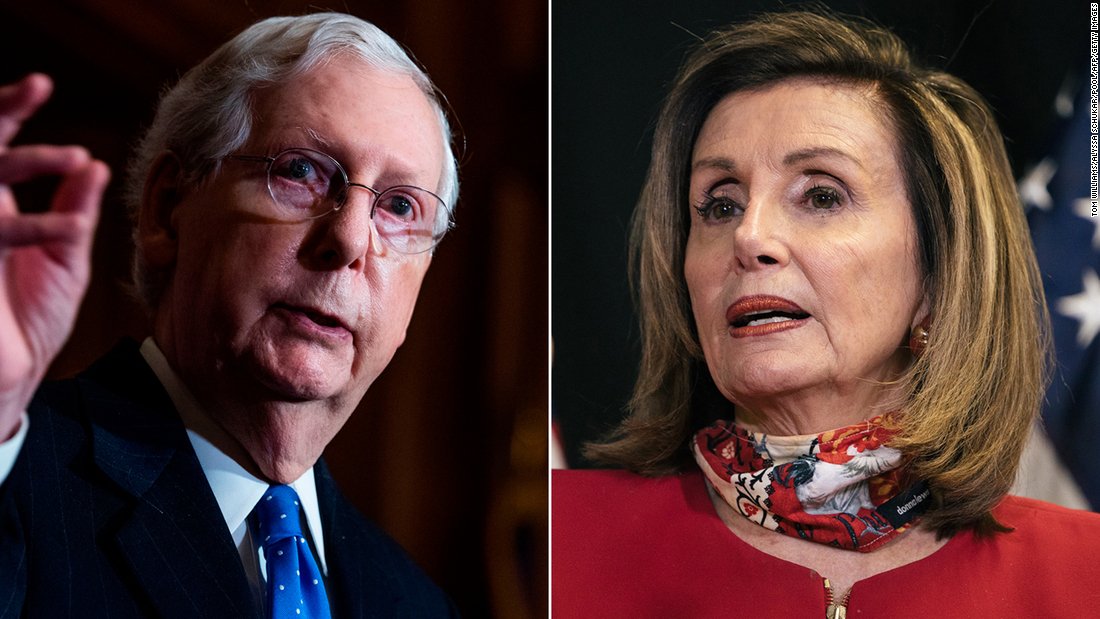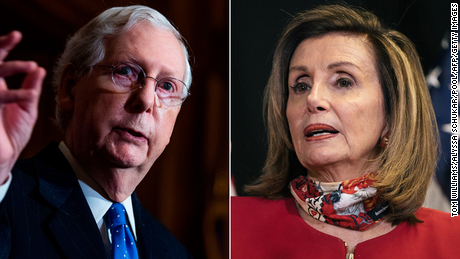Stimulus relief talks at a critical juncture
While there are some signs of progress on state and local aid in bipartisan relief talks, prospects are still grim for Congress to get a deal both sides can live with, get drafted quickly and jammed through Congress — and then onto the desk of a mercurial President who has had no role in the negotiations but can upend them at any given moment.
Friday is turning out to be a critical day on two fronts: Both on the Covid relief talks and to keep the government from shutting down for the fourth time in President Donald Trump’s time in office.
At midnight, the government will shut down absent an agreement for a quick vote on a funding bill to keep federal agencies open for another week. Because any senator can object to prevent a quick vote, McConnell needs full cooperation from all 100 senators to schedule a vote on a continuing resolution, or CR, to keep the government funded until December 18.
In other words, members have maximum leverage right now and they’re using it.
Sanders and Paul
There are two major problems: Sens. Rand Paul and Bernie Sanders.
Asked if he would let the continuing resolution, or CR, come up for a quick vote if he doesn’t get a commitment for the bill to be considered, Sanders said Thursday evening, “Let’s play it by ear. We will play it by ear. I will do everything I can to make certain that we do not leave here unless that bill is passed.”
GOP leaders are blaming him in part for holding up a CR vote. Sanders said angrily, “They can blame me for anything they want. But people back home by the millions are going to be blaming this Congress for inaction for leaving their children to go hungry or to get evicted. That’s where the blame lies in this Congress.”
Paul is concerned that the bill, in his view, ties Trump’s hands to draw down forces from Afghanistan, blaming his long-time foe, GOP Rep. Liz Cheney of Wyoming, for the inclusion of the language. He wants GOP leaders to delay the vote until next week, presumably to allow Trump to put off issuing his veto until late in the year around the Christmas holiday when it could be harder for lawmakers to return to Washington and override it.
“We’ve offered to allow all the votes to occur today if the final vote on the NDAA would be moved to Monday,” Paul told reporters in the Capitol, referring to the acronym of the bill.
GOP leaders are having none of it, with the Senate poised to defeat his filibuster attempt Friday morning. But if Paul doesn’t agree to quick passage of the defense bill after his filibuster is defeated, he could push off the final vote until Saturday, effectively delaying the CR vote until then at the earliest unless he acquiesces on that point. Even if the defense vote slips until Saturday, McConnell would need full cooperation of all 100 senators to schedule a vote on the stopgap — or the shutdown would persist until he took the time-consuming steps to jump through the necessary procedural hoops to get to a final vote.
Still, GOP leaders are confident that sometime Friday everyone will fall in line and agree to pass the week-long continuing resolution and avoid a shutdown, for now.
Sticking points on stimulus
The snafu over the stopgap portends the challenges ahead for much thornier issues — namely on a Covid relief package that has dogged Congress for several months in addition to the $1.4 trillion omnibus spending bill to fund the federal government through September 2021, a massive proposal that the two sides have struggled to finalize, prompting leaders to try to pass the week-long continuing resolution.
But there’s one big problem: Most GOP senators detest that aid — and McConnell has warned that most Republicans won’t support it, meaning it’s unlikely to pass the Senate.
As a result, McConnell has proposed ditching both items — liability protections as well as state and local aid — and only focusing on the items they agree on, such as money for vaccine distribution, small business loans and potentially jobless benefits. His aides have put out word to leadership offices on both sides that McConnell sees no path to passing any deal the group reaches on those two items.
“They’re just not going to be able to thread the needle,” Senate Majority Whip John Thune said of the bipartisan group of lawmakers working on negotiating an agreement on liability protections — one of the two controversial issues holding up a deal. “That’s my view, and maybe I’m wrong and I hope I am.”
Liability provisions are a “really complicated” subject, Thune said, “it’s going to take time” that senators don’t have to resolve.
Still, the Senate negotiators are not ready to ditch those items yet.
“I’m optimistic that we can still work out those two provisions. We had a good meeting today with additional discussion, so I’m not ready to give up on removing those yet,” Republican Sen. Susan Collins said Thursday night.
Yet even if the group reaches a deal, there’s no guarantee it will pass or get signed into law. And if McConnell tries to advance a smaller proposal instead, there’s no guarantee Democrats will allow it to pass the Senate much less the House.
The path forward on the stimulus is as unclear as it has ever been. The good news for Americans awaiting relief is that Congress operates under deadlines and next week the pressure is going to intensify again. Aides working on this are hoping that something could shake loose over the weekend. And Pelosi insisted the House could extend its session into Christmas week if necessary.
But time is running out — and going through the legislative process takes a number of days, especially if they don’t get cooperation in the Senate, which they almost certainly won’t.
![]()




